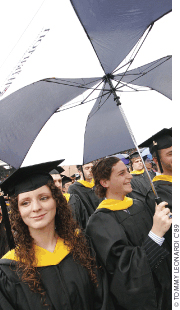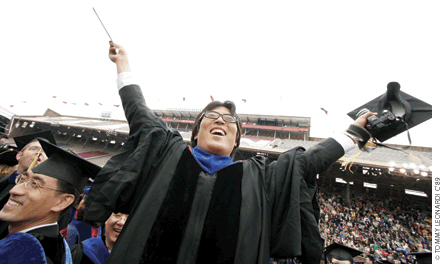
Ben Franklin and Eminem may be separated by centuries and musical sensibilities, but both the statesman and the rapper were invoked as sources of inspiration during Penn’s 250th commencement ceremony.
President Amy Gutmann invited the Class of 2006 to join her in “channeling the inventive spirit” of Franklin, which has inspired Penn graduates since the first class—“all six of them”—graduated in 1757.
After urging graduates to fill their new lives with their passions, Commencement speaker Jodie Foster borrowed some rap lyrics from Eminem:
You better lose yourself in
the music, the moment,
You own it. You better never
let it go.
One shot! Do not miss your chance to blow.
This opportunity comes once
in a lifetime.

A morning of intermittent rain didn’t keep graduates from processing down Locust Walk, their caps and gowns accessorized by the occasional wizard’s cape, 3-D glasses, and star-spangled or polka-dotted umbrella.
Many of them took the opportunity to snap photos of Foster as they passed the reviewing stand where the award-winning actor, producer, and director sat with other honored guests.
Outside Franklin Field, vendors hawked roses and rain ponchos, shouting: “Two for five dollars! You’re gonna need ’em!”
No lightning rod was needed for the occasion, but Gutmann upheld the example of its inventor, noting that Franklin, among many other attributes, “had a talent for creating something out of nothing more than the play of his unusual mind.
“Each of you has the imagination, talent, courage, and heaven knows, the playfulness to become an exemplar of Franklin’s inventive spirit,” she told the 6,000 graduates of Penn’s 12 schools. “And I know that each and every one of you has the power to solve a problem, create a daring work of art, unlock a mystery of the human mind, break new ground, and improve the world in bold and unpredictable ways.
“You [already] have invented more durable prosthetic hip implants, organized effective anti-hunger campaigns, launched the first national peer-reviewed bioethics journal by undergraduates, and staged innovative and imaginative productions of Shakespeare’s plays,” said Gutmann. “And I know you will not stop now.”
Foster, who was awarded an honorary Doctor of Arts degree, began her remarks by mocking graduation-speech clichés, such as “the hope for this country’s future.”

“If you’re anything like I was at my Yale graduation in 1984, you’ll think, ‘What a load of elitist crap.’ You’ll look around you, at your friends still bleary eyed and silly from last night’s concoctions, the buddies you curl up with, sing stupid songs with, make faces with. ‘These guys? We can’t possibly be the ones they’re talking about.’” In fact, she said, “If you’re anything like I was, you’ll spend the next six months in bed watching re-runs, feeling like a complete idiot.
“But somewhere in the middle of free-form post-graduation survival, the journey of your life has a way of sneaking off the starting line,” she said. Along the way, “you pick up bits and pieces of treasure and trash, pain and pleasure, passions and disappointments, and you start stuffing them in your bag … your big bag of experience.
“You pursue the things you love and believe in. You cast off the images of yourself that don’t fit. And suddenly you look behind you and a pattern emerges. You look in front of you and the path makes sense … This path does not belong to your parents, your teachers, your leaders, or your lovers. Your path is your character defining itself more and more every day.”
As a college student, Foster protested South African apartheid and the CIA’s presence in Central America. She bailed activist friends out of jail. “But I was never comfortable being front and center with my political opinions,” she said. “It wasn’t my way.
“All I really loved was to tell stories, to find the hidden truths in the details of people’s lives,” Foster said. “I had no idea at the time how much of a difference it can make.
“Those stories have changed me, have cut me open and spilled me out and connected me with the world around me in ways I could never have imagined,” she said. “Like the characters I have played, those women who endure terrible adversity and survive intact, victorious, heroic, I want to become better instead of worse, deeper, stronger, more truthful. With every choice I make in my lifetime I come a little closer to that goal. And perhaps in the process other women will be inspired by these portrayals to do the same. This is my way. How could I have possibly known that my freshman year in college?”
The reluctant activist did sound a political note, asserting that America is not better off than it was four years ago, when the graduates were freshman and the first anniversary of September 11 was followed by the “painful drumbeat for war.

“In that one instant of deep sorrowful mourning [after the World Trade Center attacks], the world was with us,” she said. “And then the moment was gone, in my belief, squandered. So many lives lost, for what?”
During the past year, the damage of Hurricane Katrina and the “equally disastrous and shameful reaction” of leaders “left a mark so devastating on our country that words just cannot describe,” she added.
“How will your experience pave the way for a new voice in America? I hope it will take you out of these doors, out into the open air. You will breathe it in your lungs and say, ‘From now on this life will be what I stand for, dammit. Move over. This is my story now.’”
—S.F.
Jodie Foster | As actress, director, businesswoman, and mother, you have defied Hollywood’s stereotypes to pursue your own voice … In the midst of a burgeoning career, as a young woman coming of age, you made the unusual decision to further your education and earned a degree in literature at Yale University … The first actress to receive two Oscars before the age of 30, you turned to directing and explored isolation, abuse, and fear as director and producer of Little Man Tate (1991), Nell (1994), and several other films … You have employed your incredible artistry to challenge injustice and provoke thought … taken professional risks [and] advanced the values of independence and integrity within your industry.
Henry Louis Gates, Jr. | As a brilliant scholar, author, teacher, and critic, you have devoted your life to charting the rich cultural, political, and literary terrain of the African-American experience. Your pioneering research and persuasive advocacy have thrust open a long-frozen window into our past and dramatically increased scholarly and public attention … Your memoirs, articles, lectures, and books, along with anthologies and encyclopedias that you have edited, raised transformative questions and helped to embed African-American studies into the liberal-arts curricula throughout the world … You built the DuBois Institute into a preeminent scholarly enterprise that administers the prestigious Fletcher Fellowships for the improvement of race relations.
Shirley Ann Jackson | Whether exploring microscopic particles, shaping international nuclear regulatory programs, or leading a venerable university (Rensselaer Polytechnic Institute), you have roared past the treetops and continue to rocket skyward … You earned a B.S. in physics from the Massachusetts Institute of Technology, where you founded the Black Student Union, and in 1973 you became the first African-American woman to earn a Ph.D. from MIT … You were a stellar researcher in theoretical physics at AT&T’s Bell Laboratories. In 1995, President Clinton appointed you chair of the Nuclear Regulatory Commission, a post you held with great distinction. You helped to form and served as founding chair of the International Nuclear Regulators Association.
Lawrence R. Klein | In 1980 you were awarded the Nobel Prize in Economics for developing economic forecasting models that are used throughout the world … Following stints at the University of Michigan and Oxford University, you made Penn your academic home in 1958 … You founded the Research Seminar in Economics and Wharton Econometric Forecasting Associates. You have served as a trusted adviser to American and foreign government leaders. Fired by your restless intellectual curiosity and your affinity for Asia, you helped to launch the International Economic Review, which is jointly published by Penn and Osaka University in Japan. You have fostered a lively scholarly exchange with the People’s Republic of China for more than 25 years.
Judith Pollock Klinman CW’62 Gr’66 | In a distinguished 40-year career as chemist and biochemist, you have advanced our understanding of the relationships between protein structure and function. Your research debunked existing theory and led to the discovery of quino-proteins, a new class of cofactors within proteins found in bacteria, plants, and mammals … You achieved a second research breakthrough when you observed unexpected activity while studying dehydrogenases, the enzymes that break down alcohols that otherwise could be toxic … [and discovered] processes … which fundamentally changed the way chemists think about the chemistry of enzyme catalysis … You returned to your alma mater as an assistant professor of biophysics and joined Philadelphia’s Institute for Cancer Research … Your passionate mentoring of female and minority students has inspired others to pursue [science] careers.
Stephen A. Wynn C’63 | With imagination, business acumen, and entrepreneurial prowess, you reinvented the Las Vegas casino … You played your winning hand to transform the gaming industry and launch a decade-long boom that has revitalized your adopted city … Your casinos have given much-needed boosts to tourism and to local economies. You have served your alma mater as a Trustee and enhanced our spirit of community with the gift of Wynn Commons. Other worthy causes benefit from your leadership as chair of the University of Utah’s Moran Eye Institute and member of the board of the George Bush Presidential Library.




